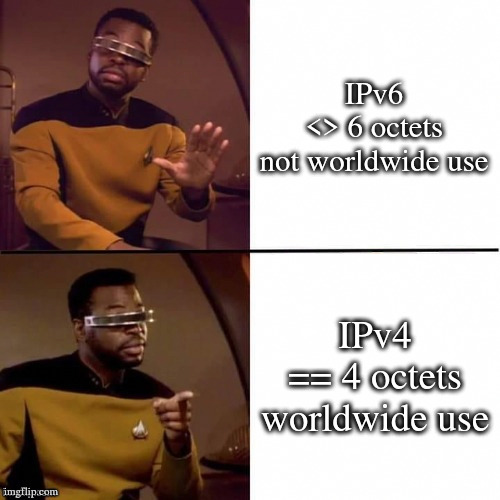this post was submitted on 19 Jun 2024
209 points (100.0% liked)
Programmer Humor
421 readers
1 users here now
Welcome to Programmer Humor!
This is a place where you can post jokes, memes, humor, etc. related to programming!
For sharing awful code theres also Programming Horror.
Rules
- Keep content in english
- No advertisements
- Posts must be related to programming or programmer topics
founded 2 years ago
MODERATORS
you are viewing a single comment's thread
view the rest of the comments
view the rest of the comments

Ha I can remember the ipv6 of cloudflare DNS just fine! It's uh..... something : something : something :: 1111
2606:4700:4700::1111
Hmm, maybe Google is easier:
2001:4860:4860::8888
Quad9 is 2620:fe::fe or 2620:fe::9
I don't understand why they can't get better addresses than that. Like surely 1::1 would be valid?
Edit: So IANA only control addresses 2001:: and up and there are quite a few IETF reservations within that. I don't know why they picked such a high number to start at. Everything else seems IETF reserved with a little space allocated for special purposes (link-local, multicast, etc.).
Address space is so huge that iirc the only global addresses in use are 2xxx::
Its so huge that it's not needed to use anything else is the goal as far as I see. If it starts with 2, it's global.
Also for routing table reasons. Ipv6 needs to use prefixes to do link aggregation or it just gets too bjg
I can see that, but surely there wouldn't be much difference matching the first 4bits (0x2XXX, 0xfXXX) vs the first 16 (0x0001)?
0:: is presumably all for loopback-type stuff, but I don't see a reason not to use 1:: through 1fff:: and they would be much easier to type/remember/validate for public DNS servers which are needed before name resolution is available.
Not sure on the history of that. It would make things like that easier